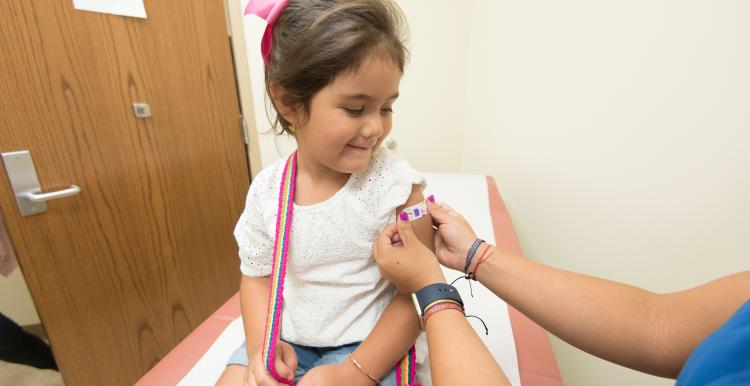Covid-19 vaccination for children 5-11

Starting from April the NHS is offering coronavirus (COVID-19) vaccines to children aged 5 to 11 years.
Click here to book or manage your child's covid-19 vaccine
Experts have advised that parents of all children aged 5 to 11 years should be offered the chance to have their child vaccinated.
Vaccination is particularly important for children who have health conditions that put them at high risk from COVID-19, as the benefits are greater.
For most children COVID-19 is a mild illness that may require a few days off school but rarely leads to complications. For a very few children, the symptoms may be more serious or last longer.
The current Omicron variant appears to be particularly mild in children. It is not known if future variants will be as mild.
Which children are at high risk from COVID-19 infection?
Children with certain health conditions, or those with a weakened immune system are at higher risk of serious COVID-19 disease.
These children and those who live with someone who has a weakened immune system should already have been invited for vaccination.
For more information on the health conditions, you can read the guide for parents of children aged 5 to 11 years at high risk or talk to your specialist or GP.
Will the vaccine protect your child?
The COVID-19 vaccination will reduce the chance of your child suffering from COVID-19 disease. It may take a few weeks for their body to build up some protection from the vaccine.
Two doses of the vaccine should give your child long lasting protection against serious complications of infection, including any future waves due to new variants.
Your child should also have some protection from the mild symptoms. The protection against mild Omicron infection should last for several weeks.
Like all medicines, no vaccine is completely effective. Some children may still get COVID-19 despite having a vaccination, but this should be less severe.
About the vaccine
Children will be offered the Pfizer COVID-19 vaccine. Each vaccine is a third of the dose of vaccine that is given to older children and adults.
Children at greater risk of serious illness if they catch COVID-19 will need 2 doses of vaccine, 8 weeks apart. All other children will be offered 2 doses of vaccine 12 weeks apart.
The vaccine has been tested to make sure it is as safe as possible. You can read the Pfizer Vaccine patient information here.
Side effects
Common side effects
Like all medicines, vaccines can cause side effects. Most of these are mild and short-term and not everyone gets them. The very common side effects should only last a day or two. The Pfizer vaccine tends to cause more side effects after the second dose than the first dose.
Very common side effects include:
- having a painful, heavy feeling and tenderness in the arm where you had your injection. This tends to be worst around 1 to 2 days after the vaccination
- feeling tired
- headache
- general aches, or mild flu like symptoms
Your child should rest and, if they are at school, they may need to take a day or two off.
You can give them paracetamol (follow the children’s dose advice in the packaging) to help make them feel better. More information on paracetamol for children is available.
Although feeling feverish is not uncommon for 2 to 3 days, a high temperature is unusual and may indicate that your child has COVID-19 or another infection.
Symptoms following vaccination normally last less than a week. If your child’s symptoms seem to get worse or if you are concerned, you can call NHS 111.
Less common side effects
Cases of inflammation of the heart (called myocarditis or pericarditis) have been reported very rarely after COVID-19 vaccines. Most cases recovered and felt better following rest and simple treatments.
In the US, all side effects have been reported much less commonly after the children’s dose of vaccine. So far, only 1 to 2 cases of myocarditis have been reported for every million doses of vaccine given.
You should seek medical advice urgently if your child experiences:
- chest pain
- shortness of breath
- feelings of having a fast-beating, fluttering, or pounding heart
If you are worried about your child call NHS 111 (or call 18001 111 on a textphone) or go to the NHS 111 website.
Make sure you tell them about the vaccination your child has received or show them your child’s record card.
If you think they have had a serious side effect from the vaccine you can report it using the Coronavirus Yellow Card scheme.
When can you take your child to be vaccinated?
Parents will receive information offering them the chance to make an appointment for their child to be vaccinated.
These appointments will be available from April over the Easter holidays and further slots will become available later.
How to book your appointment
The information you receive will explain how to make the appointment for your child.
You can call the National Booking Service on 119 to make an appointment.
You will need to take your child to a local pharmacy or vaccination centre.
What to do next
When your child has had their first injection, you should get a record card.
You should keep this card and bring it with you when taking your child for their next appointment. This will be in 8 to 12 weeks’ time.
Although the first dose will give your child good protection, they will need the second dose to get longer-lasting protection.
Keep their card safe and make sure you take your child to get their second injection.
What to do if your child is not well when their appointment is due
You should not attend a vaccine appointment if you or your child are self-isolating or waiting for a COVID-19 test.
If your child has tested positive for COVID-19, you should normally wait 12 weeks from the test before having the vaccine.
If your child had a similar illness but was not tested for COVID-19, there is no need to wait once your child is better.


